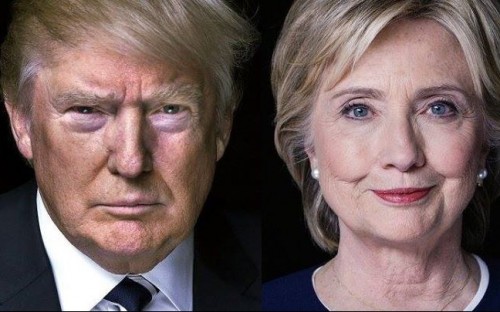After sixteen months of scandal, polls show the candidates increasingly neck-and-neck, the FBI email probe rocking Hillary’s established lead. But, in terms of personality, Donald and Hillary are poles apart.
According to political science experts, Hillary has a more conscientious, agreeable personality than Donald, which would translate into more implementable, broadly supported policies.
She’s well-versed in the art of Washington politics. According to a November Gallup poll, the majority of registered voters believe Hillary has the personality and the leadership qualities to be president. While only 32% saw the same qualities in Donald Trump.
Even so, there’s no doubt that Donald’s eccentric leadership style is popular with a significant proportion of the American population.
Leadership guru Bruce Tulgan puts it simply: “Secretary Clinton seems very purposeful, rational, deliberate, risk-averse, restrained, and calibrated,” he says. “Mr. Trump seems to be highly reactive, emotional, impulsive, risk-taking, unrestrained, and excessive.”
But what makes a good leader? And how do the two candidates’ leadership qualities compare? We reached out to the global business school community – professors, leadership experts and master’s students – to find out.
Ladan Manteghi, Georgetown University’s McDonough School of Business, US

Ladan is currently campaigning for Hillary Clinton in Broward County, Florida, a critical swing state. While she’s is a firm Democrat - she worked as an advisor for the first Clinton administration - she accepts Trump has some unique leadership qualities.
What makes a good leader is the ability to set a vision that galvanizes and unifies an organization. Whether a company CEO or a head of state, a good leader understands and empowers their people. And, together with them, leads the charge.
On Trump… Trump has done some of that from a business seat. For him, it’s about business and the bottom line of business.
Trump is a phenomenal marketer, a phenomenal brand developer. He knows how to galvanize consumers around a particular rallying cry. But leading a nation is about more than just building one brand.
On Clinton… Building consensus is what Hillary Clinton is all about. She’s dealt with constituents, business leaders and heads of state. She’s worked with and built consensus across sectors.
She’s able to understand different constituencies and respond to their needs. And she has the ability to set a vision that galvanizes and unites the people that she’s leading.
Stefan Groschl, ESSEC Business School, France
Stefan is co-founder of the Chair of Leadership and Diversity at ESSEC.

One key difference between a leader and a manager is trust. There is mutual trust between leaders and their followers. As a follower, if I cannot trust you, I’m not going to follow you. Trust comes with authentic behavior. And authentic behavior comes with decisions being made consistently based on a clear set of personal values, and a clear purpose that you act upon and others see in you.
How can you be authentic? It’s about going back to your core values and checking whether they match with your behavior and your daily life. A simple test to get you started is the funeral exercise: ‘Pretend you’re at your own funeral. What would you like the attendees to say about you? What do you want to be remembered for? Does that reflect your current life?’
On Trump… I’m not sure what Trump’s values are. But, despite all the negative press he’s received, he’s still very popular with his core followers. Thus, it seems that he is effective in communicating a set of beliefs and actions that are very attractive to these followers.
On Clinton… Clinton has more of the skills and the knowledge that come with her years of experience as a member of the political elite. In the three debates, she came across as somebody who knows what she’s talking about. But I’m not sure that people trust her.
Steen Vallentin, Copenhagen Business School, Denmark

Steen is an associate professor in Corporate Social Responsibility. He focuses his research on the political aspects of CSR, including the role of government.
In leadership studies, there’s a lot of focus on transformational qualities - the ability to inspire people and change, through charisma and certain moral qualities - rather than just the transactional qualities; the rule-following, more bureaucratic brand of leadership.
On Trump… The first very blunt and primitive analysis is to say that you find the transformational qualities in Donald Trump. People don’t know what they’re going to get exactly, but at least he stands for something different to what they’re used to.
However, the argument breaks down when you consider Trump’s moral qualities. Yes, he’s a visionary of sorts. But he’s also very much a populist; somebody who’s never concrete about any of his policies, or the accusations he makes against others.
Trump has a command-and-control conception of leadership; the benevolent dictator sitting at the top making decisions. That might to some extent work if you’re a private entrepreneur. As US president, it makes very little sense.
On Clinton… Hillary Clinton definitely represents a lot of transactional leadership qualities. She’s extremely qualified, with over 30 years of public service. But she’s not a great visionary. There doesn’t seem to be any strong vision of change behind her campaign. It’s more of the same.
With Clinton, it’s more of an integrity issue. Some of the hacked emails have shown there’s been doubts about her judgement. It’s a difficult one. In terms of her professional qualities and experience, it’s hard to imagine a more qualified candidate for the job.
Daniel Dozier, George Washington University School of Business (GWSB), US
Daniel is studying a masters of tourism administration at GWSB. He worked on Obama’s election campaigns in 2008 and 2012. He’s surprised that neither 2016 presidential candidate has paid any attention to the tourism industry.

Unfortunately, neither candidate has focused specifically on the travel and tourism industry. Which is shocking, given that it’s our largest services exporter, 3% of GDP, produces billions of dollars in revenue and provides for one in ten jobs.
Clinton doesn’t talk about it. Trump comes from the hotel industry but doesn’t talk about it either. Instead, he spouses a very negative, hateful policy around ‘the wall.’
Trump’s policies and rhetoric would be a net negative to the industry and very harmful to all the businesses in the tourism value chain. Mexicans account for around 30% of foreign visitors to the US. Trump’s rhetoric around the wall and around Mexicans being rapists discourages those tourists from coming to the US and spending money.
His policies are truly scary and yet he frames things in very accessible language. He speaks more colloquially and informally, and he makes people who maybe haven’t had the opportunities in life, feel that they have a voice and a champion.
RECAPTHA :
be
ed
8a
15








